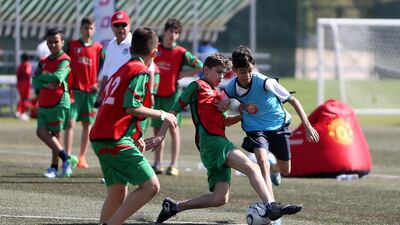DUBAI // Children should be offered intense exercise at school instead of a regular physical education lesson, an academic says.
Dr Sarah Dalibalta of the American University of Sharjah said that increasing a child’s heart rate during exercise was important for burning fat and improving fitness.
And Dr Dalibalta said the UAE needed to develop physical activity guidelines to change the shape of the nation’s health.
“Instead of a PE lesson, have a set exercise intervention where you’re making sure that the students are getting their heart rate up and they’re doing moderate to vigorous intensity exercise,” she said.
“Monitor the results in their biochemistry and physiology so you know what you are doing is effective. We should have more of this because it works.”
Dr Dalibalta believes guidelines on physical activity must come from the top.
“Many countries are developing guidelines regarding physical activity,” she said. “The UK has national guidelines, so does Ireland. The UAE needs them.”
Dr Tom Loney, assistant professor of public health at UAE University, agreed that a fresh approach was needed.
“I would like to see more leisure games, sports and activities for children in schools,” Dr Loney said. “I would like to see more structured physical education in school and more tailored activities.”
He said that people could be more active, for example, by forming walking groups to and from the mosque.
Only 17 per cent of children in the UAE achieved the daily physical activity recommendation of at least 60 minutes of moderate-to-vigorous activity, said the Report Card on Physical Activity for Children and Youth 2016.
The data used was from 2010, but it also stated that only 21 per cent of children walked or cycled to school at least once a week.
In contrast, Slovenian children largely met daily exercise needs – 97 per cent of boys between 6 and 11, and 95 per cent of girls. For those aged 6 to 18, 86 per cent of boys and 76 per cent of girls met the recommendations.
In Slovenia, pupils are physically active for at least 200 minutes a week during school days.
“Physical inactivity is an independent risk factor for cardiovascular disease,” Dr Loney said.
“If you get more people physically active then it should result in reduction in cardiovascular disease and death.”
Dr Jairam Aithal, a cardiovascular disease consultant at Burjeel Hospital in Abu Dhabi, said that with monitored exercise there were targets that could be measured.
“People know where they are headed and that’s where it really helps,” Dr Aithal said.
“I’m almost certain that the benefit of getting someone to exercise under your watchful eye will yield more benefit.
“Use facts and statistics to show our children the importance of activity and a good diet.”
Dubai Health Authority has said that nearly 58 per cent of the population were physically inactive.
newsdesk@thenational.ae


